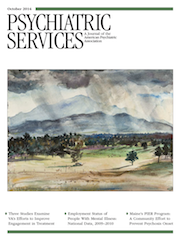Antidepressant Prescribing in Elderly Populations: In Reply
In Reply: We thank Dr. Wiechers and Dr. Maust for their comments. In response, we would emphasize three points. As we discuss in our report, our data reflect providers’ recording of mental health diagnoses during a single year, excluding any diagnoses recorded in a prior year and cases in which a provider recognized a mental health diagnosis without recording it (1). Consequently, our estimate that only 27% of patients who were using newer antidepressants had no mental health diagnosis is an upper bound, and the true proportion is certainly lower.
Second, providers’ diagnoses of adjustment disorder versus major depression do not reliably distinguish different levels of depression severity. We agree that antidepressant treatment may be unnecessary or even inappropriate for less severe depression. But our previous research (2,3) indicates that providers’ use of different diagnostic codes is more related to providers’ practice styles than to severity of depressive symptoms.
Third, we do not agree that depression diagnoses made in the context of serious general medical illness represent demoralization or some other condition not deserving of treatment. Depression in the context of serious medical illness is not distinct in terms of phenomenology (4) or response to treatment (5).
1 : The deliberate misdiagnosis of depression in primary care. Archives of Family Medicine 3:333–337, 1994Crossref, Medline, Google Scholar
2 : Telephone psychotherapy and telephone care management for primary care patients starting antidepressant treatment: a randomized controlled trial. JAMA 292:935–942, 2004Crossref, Medline, Google Scholar
3 : Treatment process and outcomes for managed care patients receiving new antidepressant prescriptions from psychiatrists and primary care physicians. Archives of General Psychiatry 58:395–401, 2001Crossref, Medline, Google Scholar
4 : Medical comorbidity and validity of DSM-IV depression criteria. Psychological Medicine 36:27–36, 2006Crossref, Medline, Google Scholar
5 : Clinical and functional outcomes of depression treatment in patients with and without chronic medical illness. Psychological Medicine 35:271–279, 2005Crossref, Medline, Google Scholar



